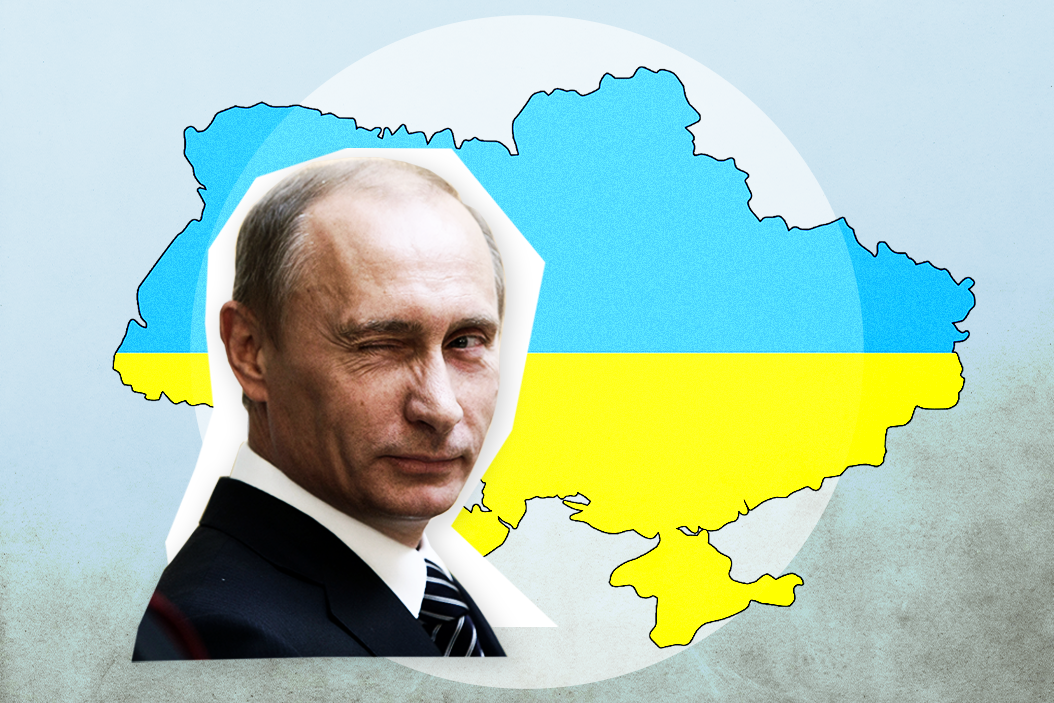Russia has been massing soldiers along the Ukrainian border — again.
This time it's roughly 100,000 troops. The Ukrainians, Americans, and Europeans are all alarmed. The head of the CIA has raised the issue with Putin directly. US Secretary of State Tony Blinken is issuing strongly-worded statements, and on Tuesday, Germany suddenly delayed the construction of a massive new natural gas pipeline from Russia. Things are getting tense.
With the EU and Russia already at odds over the worsening situation at the Belarus-Poland border, a lot of people are wondering: is Putin going to invade Ukraine… again?
In a word: No.
In 350 words: The costs of an invasion, both human and material, almost certainly outweigh any conceivable benefits. It is true that annexing Crimea and supporting the separatist uprisings in eastern Ukraine in 2014 boosted Putin's popularity at a time when his approval ratings were flagging. And today, his popularity is again near pre-Crimea lows because of persistent economic malaise and a rampant pandemic. His moves to crush what remains of Russia's independent opposition certainly don't give the impression that he feels secure.
But consider what an invasion of even a part of Ukraine might look like today. Back in 2014, after Moscow's man in Kyiv, Viktor Yanukovich, was forced to flee a popular revolution, Russia rushed into areas of Ukraine where there were already large ethnic Russian populations. People there spooked by the anti-Russian rhetoric of the government that took power after Yanukovich's ouster were often eager to be "rescued" by Russia.
Today, no other regions of Ukraine fit that description. To invade today would mean entering an almost entirely hostile country, risking a significant amount of casualties. It's not as though the 225,000-strong Ukrainian army, reinforced since 2014 with US weapons, would roll out a red carpet for Putin. And back home in Russia, an invasion wouldn't be popular. Polls show that only 13 percent of Russians think a war with Ukraine would boost Putin's standing. Twice as many think it would hurt him. Putin could certainly manufacture a more supportive narrative, but he'd be fighting an uphill battle.
Plus, occupation isn't cheap. Nursing the separatist governments in eastern Ukraine costs Russia about $4 billion a year. Crimea about half that, annually. That comes on top of the billions in new infrastructure it has built on the peninsula.
In many ways, Putin already has Ukraine right where he wants it. No, it's not the pliant client state that he'd like, but it is largely paralyzed between East and West, which is as good an outcome as Putin can realistically get. There is no serious prospect of Ukraine joining either NATO or the EU. Russia's annexation of Crimea in 2014 enabled the Kremlin to keep an eye on who's doing what in the Black Sea. And Ukraine's dysfunctional post-revolution politics are hardly a source of inspiration for Russians wondering about their own future.
So… why is Putin mustering all these troops? It's hard to know for sure, says Alex Brideau, head of Russia analysis at Eurasia Group, but one explanation he notes is that Putin is simply sending a message to the Ukrainian government and its western backers: don't you push us too hard.
Moscow is unhappy about increased US military aid to Kyiv, Ukraine's deployment of Turkish drones near the front lines in Eastern Ukraine, and NATO warships patrolling the Black Sea. Moscow and Kyiv are also still deadlocked on how to solve the conflict: Russia wants broad autonomy for the separatist regions, while Ukraine wants control of the Russia-Ukraine border back first.
Upshot: An invasion is hard to imagine, but with that many troops milling around, and so little trust between the two sides, keep an eye on the Russia-Ukraine border these days.- Biden-Xi virtual summit shows breakthroughs in US-China relationship - GZERO Media ›
- Europe can show solidarity with Ukraine despite depending on Russian gas - GZERO Media ›
- Concerns increase over Russian military activity near Ukraine - GZERO Media ›
- Biden and Putin hold virtual meeting as US-Russia tensions increase - GZERO Media ›
- Biden & Putin will continue Ukraine talks; Germany’s new chancellor - GZERO Media ›
- Russia's makes unrealistic proposals as Ukraine buildup continues - GZERO Media ›
- Russia makes unrealistic proposals as Ukraine buildup continues - GZERO Media ›
- Why this COVID surge is different than 2020; behind Putin's threats - GZERO Media ›
- Russia cares more about Ukraine than the US does - GZERO Media ›
- Putin has a “noose” around Ukraine, says Russia analyst Alina Polyakova - GZERO Media ›
- The problem with China’s Zero COVID strategy | GZERO World Podcast - GZERO Media ›
- Will Putin invade Ukraine? - GZERO Media ›
- Biden deploys US troops to Eastern Europe as a deterrent - GZERO Media ›
- Ukraine: Biggest foreign policy test for the Biden administration - GZERO Media ›
- Petraeus: Taking Ukraine is one thing, holding onto it is another - GZERO Media ›
- War in Ukraine - GZERO Media ›
- Kazakhstan unrest could affect Putin's view on Ukraine - GZERO Media ›
- Trump-Putin chat over Ukraine "deeply" worries Europe - GZERO Media ›
- Can Europe broker a Ukraine ceasefire? - GZERO Media ›
More For You
Think you know what's going on around the world? Here's your chance to prove it.
Most Popular
The US government will reportedly fund MAGA-aligned parties and think tanks in Europe. But with US President Donald Trump’s favorability in Europe so low, do they even want the money?
Zelensky agrees: elections matter #PUPPETREGIME
As more small businesses move sales, payments, and customer relationships online, they unlock new opportunities, but they also become easier targets for cyber-criminals and other threat actors.
